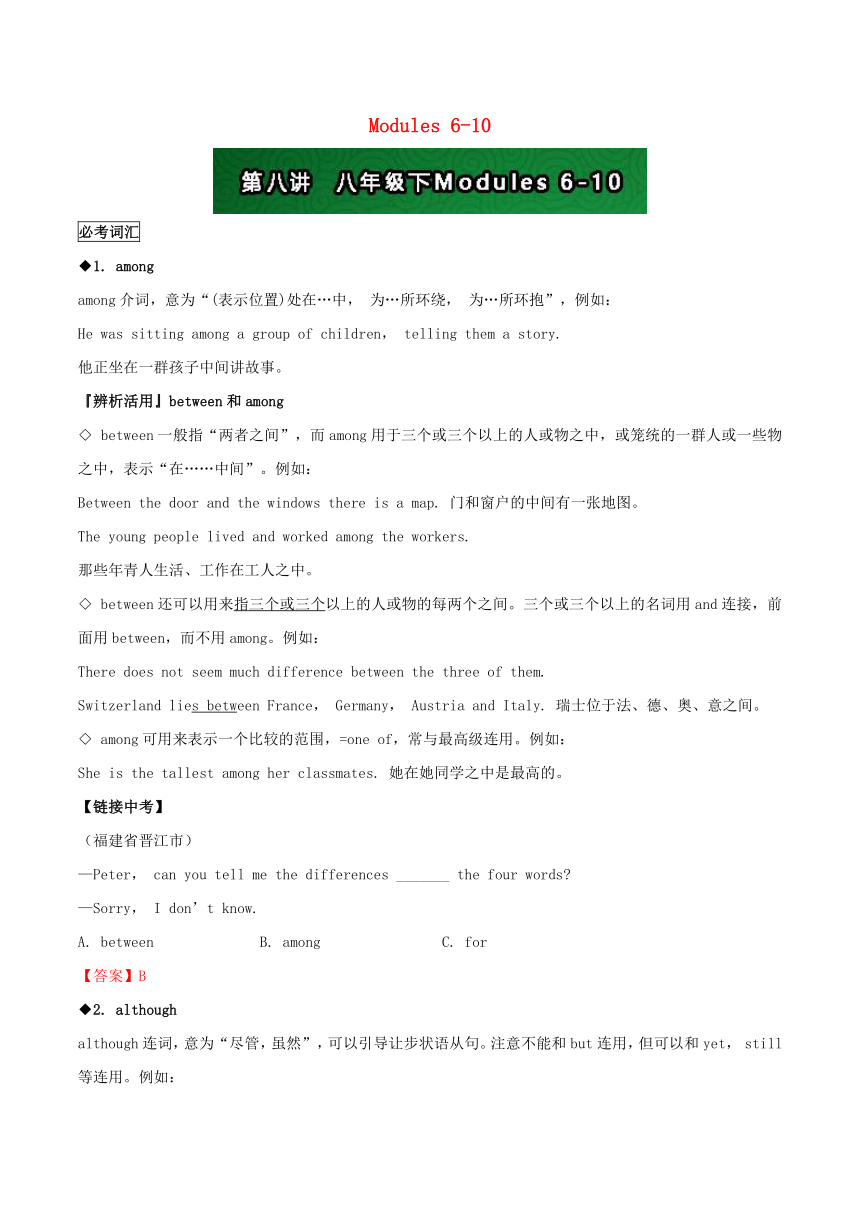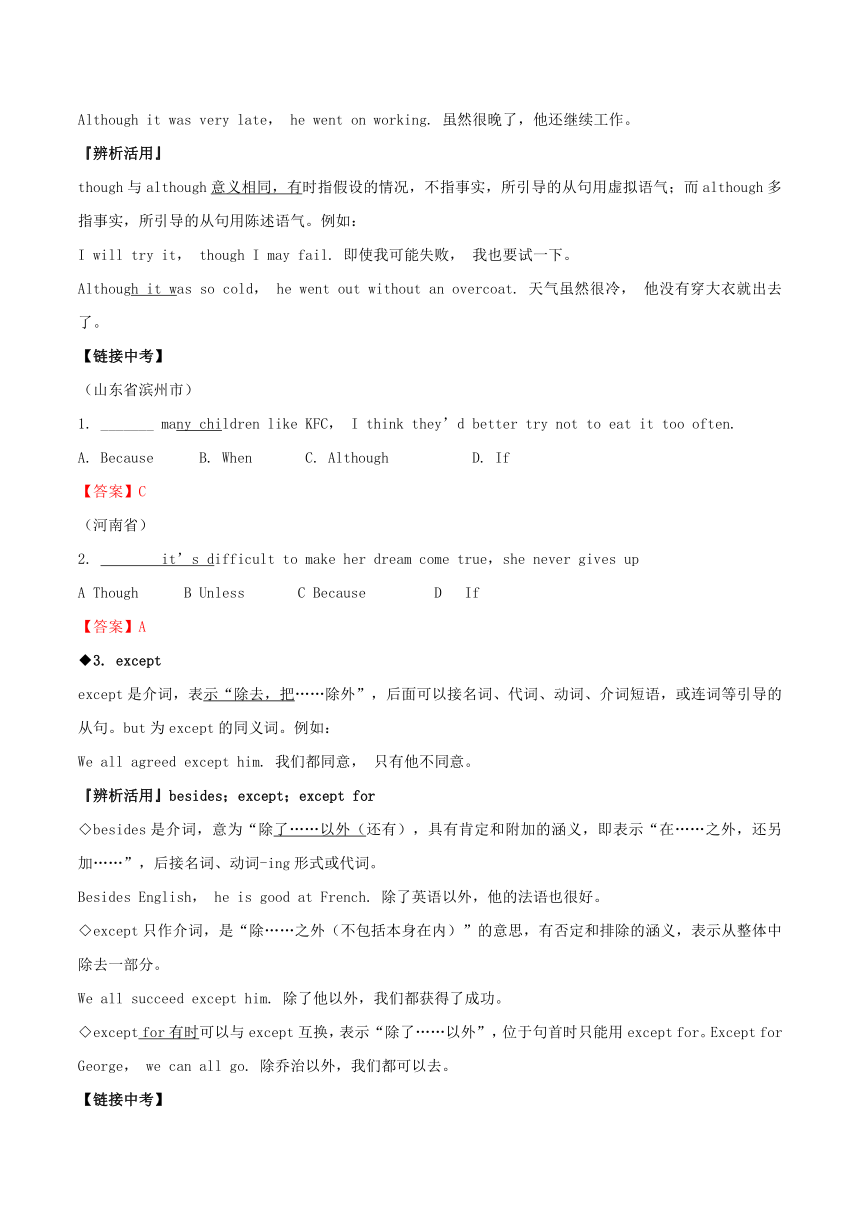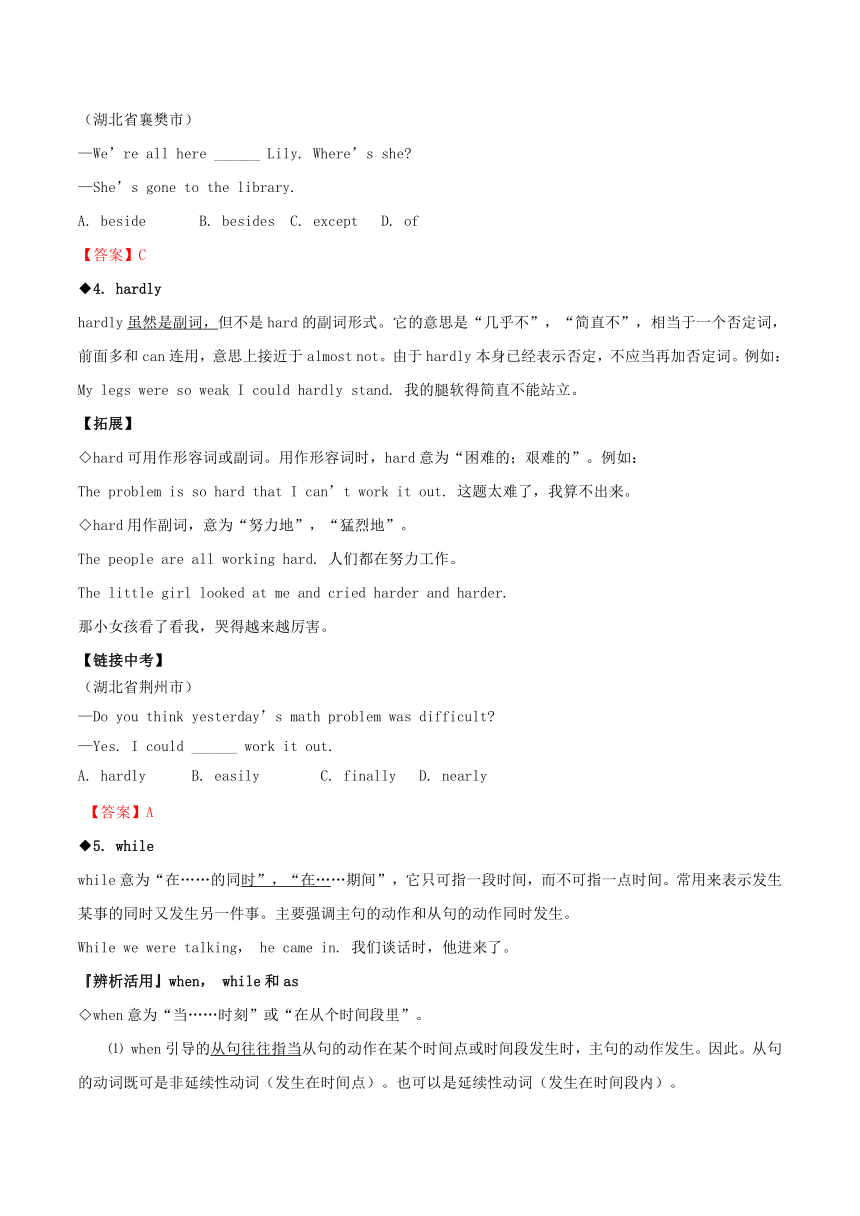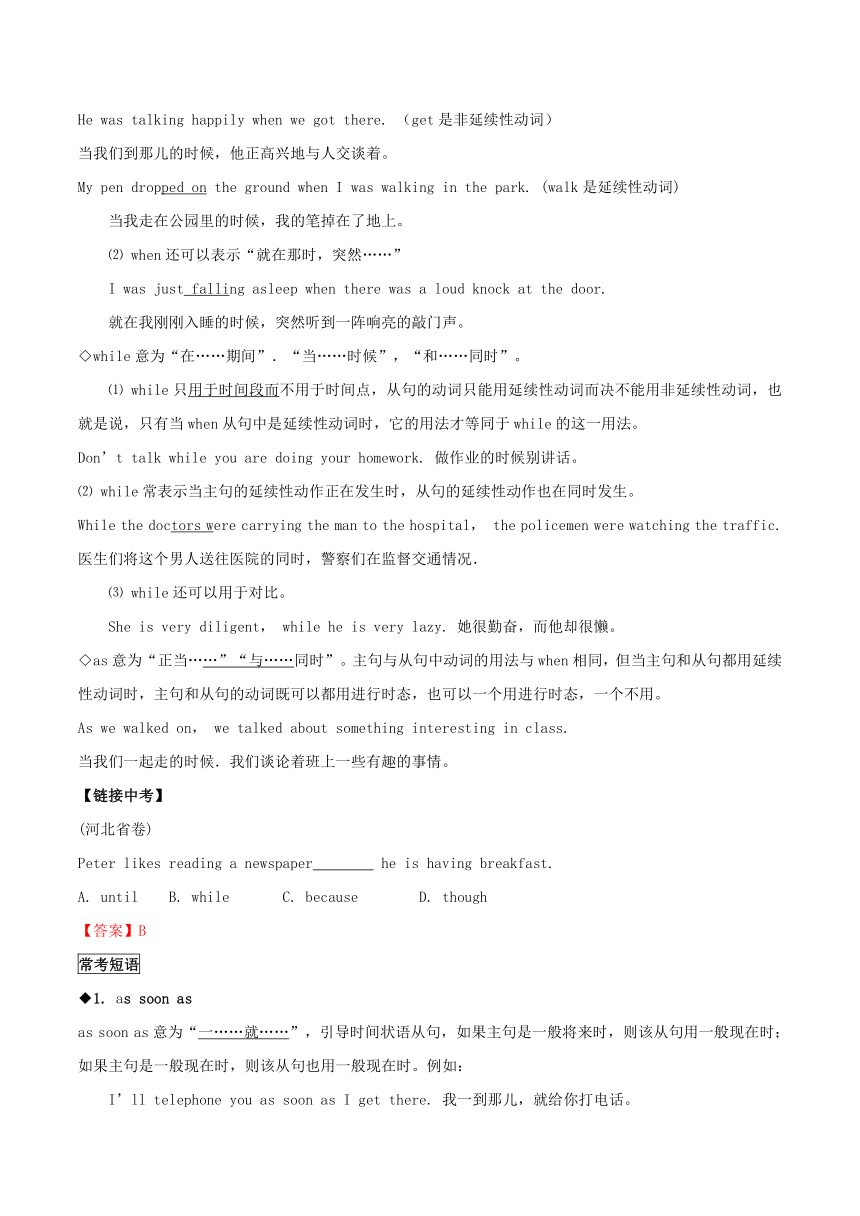外研版中考英语总复习(上册)第二篇 课本要点梳理 第八讲 八下 Modules 6-10
文档属性
| 名称 | 外研版中考英语总复习(上册)第二篇 课本要点梳理 第八讲 八下 Modules 6-10 |  | |
| 格式 | zip | ||
| 文件大小 | 36.0KB | ||
| 资源类型 | 教案 | ||
| 版本资源 | 外研版 | ||
| 科目 | 英语 | ||
| 更新时间 | 2016-08-26 06:59:32 | ||
图片预览




文档简介
Modules
6-10
必考词汇
◆1.
among
among介词,意为“(表示位置)处在…中,
为…所环绕,
为…所环抱”,例如:
He
was
sitting
among
a
group
of
children,
telling
them
a
story.
他正坐在一群孩子中间讲故事。
『辨析活用』between和among
◇
between一般指“两者之间”,而among用于三个或三个以上的人或物之中,或笼统的一群人或一些物之中,表示“在……中间”。例如:
Between
the
door
and
the
windows
there
is
a
map.
门和窗户的中间有一张地图。
The
young
people
lived
and
worked
among
the
workers.
那些年青人生活、工作在工人之中。
◇
between还可以用来指三个或三个
( http: / / www.21cnjy.com )以上的人或物的每两个之间。三个或三个以上的名词用and连接,前面用between,而不用among。例如:
There
does
not
seem
much
difference
between
the
three
of
them.
Switzerland
lies
betw
( http: / / www.21cnjy.com )een
France,
Germany,
Austria
and
Italy.
瑞士位于法、德、奥、意之间。
◇
among可用来表示一个比较的范围,=one
of,常与最高级连用。例如:
She
is
the
tallest
among
her
classmates.
她在她同学之中是最高的。
【链接中考】
(福建省晋江市)
—Peter,
can
you
tell
me
the
differences
_______
the
four
words
—Sorry,
I
don’t
know.
A.
between
B.
among
C.
for
【答案】B
◆2.
although
although连词,意为“尽管,虽然”,可以引导让步状语从句。注意不能和but连用,但可以和yet,
still等连用。例如:
Although
it
was
very
late,
he
went
on
working.
虽然很晚了,他还继续工作。
『辨析活用』
though与although意义相同,有
( http: / / www.21cnjy.com )时指假设的情况,不指事实,所引导的从句用虚拟语气;而although多指事实,所引导的从句用陈述语气。例如:
I
will
try
it,
though
I
may
fail.
即使我可能失败,
我也要试一下。
Although
it
w
( http: / / www.21cnjy.com )as
so
cold,
he
went
out
without
an
overcoat.
天气虽然很冷,
他没有穿大衣就出去了。
【链接中考】
(山东省滨州市)
1.
_______
many
chi
( http: / / www.21cnjy.com )ldren
like
KFC,
I
think
they’d
better
try
not
to
eat
it
too
often.
A.
Because
B.
When
C.
Although
D.
If
【答案】C
(河南省)
2.
it’s
d
( http: / / www.21cnjy.com )ifficult
to
make
her
dream
come
true,she
never
gives
up
A
Though
B
Unless
C
Because
D
If
【答案】A
◆3.
except
except是介词,表示“除去,把
( http: / / www.21cnjy.com )……除外”,后面可以接名词、代词、动词、介词短语,或连词等引导的从句。but为except的同义词。例如:
We
all
agreed
except
him.
我们都同意,
只有他不同意。
『辨析活用』besides;except;except
for
◇besides是介词,意为“除了……以外(
( http: / / www.21cnjy.com )还有),具有肯定和附加的涵义,即表示“在……之外,还另加……”,后接名词、动词-ing形式或代词。
Besides
English,
he
is
good
at
French.
除了英语以外,他的法语也很好。
◇except只作介词,是“除……之外(不包括本身在内)”的意思,有否定和排除的涵义,表示从整体中除去一部分。
We
all
succeed
except
him.
除了他以外,我们都获得了成功。
◇except
for有时
( http: / / www.21cnjy.com )可以与except互换,表示“除了……以外”,位于句首时只能用except
for。Except
for
George,
we
can
all
go.
除乔治以外,我们都可以去。
【链接中考】
(湖北省襄樊市)
—We’re
all
here
______
Lily.
Where’s
she
—She’s
gone
to
the
library.
A.
beside
B.
besides
C.
except
D.
of
【答案】C
◆4.
hardly
hardly虽然是副词,
( http: / / www.21cnjy.com )但不是hard的副词形式。它的意思是“几乎不”,“简直不”,相当于一个否定词,前面多和can连用,意思上接近于almost
not。由于hardly本身已经表示否定,不应当再加否定词。例如:
My
legs
were
so
weak
I
could
hardly
stand.
我的腿软得简直不能站立。
【拓展】
◇hard可用作形容词或副词。用作形容词时,hard意为“困难的;艰难的”。例如:
The
problem
is
so
hard
that
I
can’t
work
it
out.
这题太难了,我算不出来。
◇hard用作副词,意为“努力地”,“猛烈地”。
The
people
are
all
working
hard.
人们都在努力工作。
The
little
girl
looked
at
me
and
cried
harder
and
harder.
那小女孩看了看我,哭得越来越厉害。
【链接中考】
(湖北省荆州市)
—Do
you
think
yesterday’s
math
problem
was
difficult
—Yes.
I
could
______
work
it
out.
A.
hardly
B.
easily
C.
finally
D.
nearly
【答案】A
◆5.
while
while意为“在……的同时”,“在…
( http: / / www.21cnjy.com )…期间”,它只可指一段时间,而不可指一点时间。常用来表示发生某事的同时又发生另一件事。主要强调主句的动作和从句的动作同时发生。
While
we
were
talking,
he
came
in.
我们谈话时,他进来了。
『辨析活用』when,
while和as
◇when意为“当……时刻”或“在从个时间段里”。
⑴
when引导的从句往往指当
( http: / / www.21cnjy.com )从句的动作在某个时间点或时间段发生时,主句的动作发生。因此。从句的动词既可是非延续性动词(发生在时间点)。也可以是延续性动词(发生在时间段内)。
He
was
talking
happily
when
we
got
there.
(get是非延续性动词)
当我们到那儿的时候,他正高兴地与人交谈着。
My
pen
dropped
on
( http: / / www.21cnjy.com )
the
ground
when
I
was
walking
in
the
park.
(walk是延续性动词)
当我走在公园里的时候,我的笔掉在了地上。
⑵
when还可以表示“就在那时,突然……”
I
was
just
falli
( http: / / www.21cnjy.com )ng
asleep
when
there
was
a
loud
knock
at
the
door.
就在我刚刚入睡的时候,突然听到一阵响亮的敲门声。
◇while意为“在……期间”.“当……时候”,“和……同时”。
⑴
while只用于时间段而
( http: / / www.21cnjy.com )不用于时间点,从句的动词只能用延续性动词而决不能用非延续性动词,也就是说,只有当when从句中是延续性动词时,它的用法才等同于while的这一用法。
Don’t
talk
while
you
are
doing
your
homework.
做作业的时候别讲话。
⑵
while常表示当主句的延续性动作正在发生时,从句的延续性动作也在同时发生。
While
the
doctors
w
( http: / / www.21cnjy.com )ere
carrying
the
man
to
the
hospital,
the
policemen
were
watching
the
traffic.
医生们将这个男人送往医院的同时,警察们在监督交通情况.
⑶
while还可以用于对比。
She
is
very
diligent,
while
he
is
very
lazy.
她很勤奋,而他却很懒。
◇as意为“正当……”“与……
( http: / / www.21cnjy.com )同时”。主句与从句中动词的用法与when相同,但当主句和从句都用延续性动词时,主句和从句的动词既可以都用进行时态,也可以一个用进行时态,一个不用。
As
we
walked
on,
we
talked
about
something
interesting
in
class.
当我们一起走的时候.我们谈论着班上一些有趣的事情。
【链接中考】
(河北省卷)
Peter
likes
reading
a
newspaper
he
is
having
breakfast.
A.
until
B.
while
C.
because
D.
though
【答案】B
常考短语
◆1.
as
soon
as
as
soon
as意为“一……就……
( http: / / www.21cnjy.com )”,引导时间状语从句,如果主句是一般将来时,则该从句用一般现在时;如果主句是一般现在时,则该从句也用一般现在时。例如:
I’ll
telephone
you
as
soon
as
I
get
there.
我一到那儿,就给你打电话。
The
baby
stopped
cr
( http: / / www.21cnjy.com )ying
as
soon
as
he
saw
his
mother.
一见到他妈妈,小婴儿就不哭了。
【链接中考】
(恩施市)
1.
He
will
come
here
right
away
______
he
hears
the
news.
A.
so
B.
as
soon
as
C.
because
D.
though
【答案】B
(北京市)
2.
Tom
will
call
me
as
soon
as
he
______
home.
A.
gets
B.
has
got
C.
got
D.
will
get
【答案】A
◆2.
depend
on
depend主要意思为“依靠”、“依赖”、“取决于”等,只用作不及物动词,通常与介词
on,
upon
连用,主要用法有:
⑴
depend
on
[upon]+某人或某物。例如:
Whether
we’ll
go
camping
depends
on
the
weather.
我们是否去野营要看天气。
有时可在某人或某物后用介词
for。例如:
We
depend
on
the
radio
for
news.
我们靠收音机听新闻。
⑵
depend
on
[upon]+某人或某物+不定式或动名词。例如:
I’m
depending
on
you
to
do
the
work.
我指望你做这工作。
⑶
depend
on
[upon]+从句。例如:
Our
success
de
( http: / / www.21cnjy.com )pends
on
whether
everyone
works
hard
or
not.
我们的成功取决于每个人是否努力。
【链接中考】
(湖北省黄石市)
Whether
I’ll
go
to
Shanghai
______
the
result
of
the
examination.
A.
belongs
to
B.
cares
about
C.
depends
on
D.
Aims
at
【答案】C
经典句型
◆1.
I
told
her
not
to
worry.
tell
sb.
To
do
sth.
( http: / / www.21cnjy.com )
意为“让某人干某事”,其否定形式为tell
sb.
not
to
do
sth.
含义相近的结构还有ask
sb.
(not)
to
do
sth.
例如:
His
mum
told
him
not
to
fight
at
school.
他妈妈让他不要再学校打架。
【链接中考】
(河南省)
Father
often
tells
me
______
too
much
time
on
computer
games.
A
don’t
spend
B
not
spend
C
not
to
spend
D
not
spending
【答案】C
◆2.
I’m
looking
forward
to
this!
look
forward
to作“盼望
( http: / / www.21cnjy.com )、期望”解,常用于表示愉快或满足的心情,期望或向往某事,例如:
Every
child
is
looking
forward
to
the
Spring
Festival.
We
are
looking
forward
to
seeing
each
other
soon.
注意:look
forward
to中to为介词,故接动词时应使用动名词。
【链接中考】
(黑龙江省哈尔滨市)
Every
one
of
you
is
( http: / / www.21cnjy.com )looking
forward
______
getting
a
good
result.
Better
think
carefully
before
writing
down
your
answers.
Wish
you
success!
A.
on
B.
in
C.
to
【答案】C
(广西省定西市)
The
boy
is
looking
forward
to
a
good
time
after
the
exam.
A.
to
have
B.
has
C.
having
D.
have
【答案】C
◆3.
He
studied
medicine
so
that
he
could
become
a
doctor.
◇
so
that引导目的状语从句,其从句中
( http: / / www.21cnjy.com )的谓语动词通常和can,
may,
should等情态动词连用,而且主句和从句之间不使用逗号,意为“以便,为了,使能够”。例如:
They
got
up
early
so
that
they
could
catch
the
early
bus.
为了能赶上早班车,他们早早就起床了。
Say
slowly
so
that
I
can
understand
you.
说慢点,好让我听明白。
◇
so
that也可以用来引导结果
( http: / / www.21cnjy.com )状语从句,意为“因此,结果”,这时其从句中的谓语动词不与情态动词连用。这种结构和so…that…引导的结果在含义上有很大的区别。so
that句型所表示的结果往往同主句有因果关系,而so…that…句型所表示的结果往往表明so后面形容词或副词和程度。请比较:
He
didn’t
plan
his
( http: / / www.21cnjy.com )time
well,
so
that
he
didn’t
finish
his
work
in
time.
他没有把时间计划好,结果没有按时完成这项工作。(没按时完成这项工作的原因是没计划好时间)
It’s
so
hot
that
I
can’t
sleep.
天气热得我不能入睡。(天气热到人不能入睡的程度。)
【链接中考】
(广东省)
The
teacher
speaks
very
loudly
all
the
students
can
hear
her.
A.
so
that
B.
because
C.
since
D.
when
【答案】A
◆4.
So
would
I!
这个句型中的so与代词“这样”、“这么”
( http: / / www.21cnjy.com )及连词“因此”、“所以”不同,在这个句型中,
so常用来代替上文中的形容词、名词或动名词,表示赞同。
“So+be动词(助动词、情态
( http: / / www.21cnjy.com )动词)+主语”结构用以承接前一句的内容,表示“(甲如此),乙也如此”。be动词、助动词、情态动词要和前一句的谓语动词保持一致。例如:
He
can
swim,
and
so
can
I.
他会游泳,我也会。
【注意】“So+谓语+主语”与“So+主语+谓语”的区别:
①当两个句子指的是两个人时,So后句子要倒装。例如:
He
is
a
student.
So
am
I.
他是个学生。我也是。
②当两个句子指的是同一个人时,So后句子不倒装。例如:
—Lucy
likes
dark
blue.
露西喜欢深蓝色。
—So
she
does.
是的。(她是喜欢深蓝色)
【链接中考】
(山东省莱芜市)
1.
Yao
Ming
works
hard
on
his
English
and
_______.
A.
so
Liu
Xiang
does
B.
so
is
Liu
Xiang
C.
so
does
Liu
Xiang
D.
so
Liu
Xiang
is
【答案】C
(甘肃省兰州市)
2.
—
I
hear
Huang
( http: / / www.21cnjy.com )Gang
made
an
English
speech
at
the
graduation
ceremony
yesterday.
—______,
and
______.
A.
So
he
did,
so
did
I
B.
So
did
he,
so
I
did
C.
So
he
was,
so
was
I
D.
So
was
he,
so
I
was
【答案】A
(四川省眉山市)
3.
—
My
brother
and
I
will
go
to
the
library
tomorrow.
—______.
Shall
we
go
together
A.
So
am
I
B.
So
do
I
C.
So
I
am
D.
So
will
I
【答案】D
◆5.
…although
it
wo
( http: / / www.21cnjy.com )uld
take
so
long
that
you’d
need
to
come
back
immediately.
so…that…意为“如此……以致……”,引导表示结果的状浯从句。so是副词,用以修饰其后的形容词或副词,说明其程度的大小。
在“so…that…”句型中的that在口语中常可以省去,其意思不变。例如:
The
story
was
so
funny
it
made
everybody
1augh.
这故事太滑稽了,把大家都逗笑了。
本句型中的“so+adj.
( http: / / www.21cnjy.com )(adv.
)可以提至句首,以加强语气,但要注意用倒装语序。例如:So
bright
was
the
moon
that
the
flowers
were
bright
as
by
day.
在如此明亮的月光下,花儿就像在白天一样鲜艳。
【拓展】so.
.
.
that和such.
.
.
that都是表示“如此……以致于”,引导结果状语从句。用法上要注意so+形容词或副词;such十名词,that后面是一个完整的句子。
He
is
so
young
that
he
can’t
go
to
school.
He
is
such
a
young
boy
that
he
can’t
go
to
school.
●so…that与such…that的肯定形式可用enough
to改写,其否定形式则由too…to改写。
English
is
so
useful
that
we
must
learn
it
well.
→English
is
useful
enough
for
us
to
learn
it
well.
I’m
so
tired
that
I
can’t
go
any
farther.
→I’m
too
tired
to
go
any
farther.
【链接中考】
(青海省,宁夏)
1.
—Did
you
catch
what
the
teacher
said
—No.
She
spoke
so
fast
______
I
couldn’t
hear
her
very
clearly.
A.
which
B.
that
C.
when
D.
since
【答案】B
(江苏省宿迁市)
2.
This
is
_______
difficult
problem
that
few
students
can
work
it
out.
A.
so
B.
so
a
C.
such
D.
such
a
【答案】D
◆6.
From
most
teenagers
it
wouldn’t
be
a
holiday
at
all.
at
all用于否定句,意为:根本不、一点也不。例如:
It
wasn’t
difficult
at
all.
这一点也不难。
There
was
nothing
to
eat
at
all.
根本没什么可吃的。
注:在否定句中,at
all
可位于句末,也可跟在否定词后。例如:
He
isn’t
tired
at
all.
/
He’s
not
at
all
tired.
他一点也不累。
另外,在口语中单独说
not
at
all,
可用来回答感谢或道歉。例如:
—Thank
you
very
much.
多谢你了。
—Not
at
all.
不客气。
—I’m
sorry
to
keep
you
waiting.
对不起,让你久等了。
—Oh,
not
at
all.
噢,没关系。
【链接中考】
(江苏省镇江市)
1.
—
Jerry,
do
you
mind
my
pointing
out
your
mistakes
—_______.
Your
advice
is
of
great
value
to
me.
A.
Not
at
all
B.
You’d
better
not
C.
Of
course
D.
It’s
my
pleasure
【答案】A
(四川省巴中市)
2.
—
Would
you
mind
my
taking
this
seat
—______.
A.
Sorry,
I
can’t
( http: / / www.21cnjy.com )
B.
No,
not
at
all
C.
It’s
a
pleasure
【答案】B
6-10
必考词汇
◆1.
among
among介词,意为“(表示位置)处在…中,
为…所环绕,
为…所环抱”,例如:
He
was
sitting
among
a
group
of
children,
telling
them
a
story.
他正坐在一群孩子中间讲故事。
『辨析活用』between和among
◇
between一般指“两者之间”,而among用于三个或三个以上的人或物之中,或笼统的一群人或一些物之中,表示“在……中间”。例如:
Between
the
door
and
the
windows
there
is
a
map.
门和窗户的中间有一张地图。
The
young
people
lived
and
worked
among
the
workers.
那些年青人生活、工作在工人之中。
◇
between还可以用来指三个或三个
( http: / / www.21cnjy.com )以上的人或物的每两个之间。三个或三个以上的名词用and连接,前面用between,而不用among。例如:
There
does
not
seem
much
difference
between
the
three
of
them.
Switzerland
lies
betw
( http: / / www.21cnjy.com )een
France,
Germany,
Austria
and
Italy.
瑞士位于法、德、奥、意之间。
◇
among可用来表示一个比较的范围,=one
of,常与最高级连用。例如:
She
is
the
tallest
among
her
classmates.
她在她同学之中是最高的。
【链接中考】
(福建省晋江市)
—Peter,
can
you
tell
me
the
differences
_______
the
four
words
—Sorry,
I
don’t
know.
A.
between
B.
among
C.
for
【答案】B
◆2.
although
although连词,意为“尽管,虽然”,可以引导让步状语从句。注意不能和but连用,但可以和yet,
still等连用。例如:
Although
it
was
very
late,
he
went
on
working.
虽然很晚了,他还继续工作。
『辨析活用』
though与although意义相同,有
( http: / / www.21cnjy.com )时指假设的情况,不指事实,所引导的从句用虚拟语气;而although多指事实,所引导的从句用陈述语气。例如:
I
will
try
it,
though
I
may
fail.
即使我可能失败,
我也要试一下。
Although
it
w
( http: / / www.21cnjy.com )as
so
cold,
he
went
out
without
an
overcoat.
天气虽然很冷,
他没有穿大衣就出去了。
【链接中考】
(山东省滨州市)
1.
_______
many
chi
( http: / / www.21cnjy.com )ldren
like
KFC,
I
think
they’d
better
try
not
to
eat
it
too
often.
A.
Because
B.
When
C.
Although
D.
If
【答案】C
(河南省)
2.
it’s
d
( http: / / www.21cnjy.com )ifficult
to
make
her
dream
come
true,she
never
gives
up
A
Though
B
Unless
C
Because
D
If
【答案】A
◆3.
except
except是介词,表示“除去,把
( http: / / www.21cnjy.com )……除外”,后面可以接名词、代词、动词、介词短语,或连词等引导的从句。but为except的同义词。例如:
We
all
agreed
except
him.
我们都同意,
只有他不同意。
『辨析活用』besides;except;except
for
◇besides是介词,意为“除了……以外(
( http: / / www.21cnjy.com )还有),具有肯定和附加的涵义,即表示“在……之外,还另加……”,后接名词、动词-ing形式或代词。
Besides
English,
he
is
good
at
French.
除了英语以外,他的法语也很好。
◇except只作介词,是“除……之外(不包括本身在内)”的意思,有否定和排除的涵义,表示从整体中除去一部分。
We
all
succeed
except
him.
除了他以外,我们都获得了成功。
◇except
for有时
( http: / / www.21cnjy.com )可以与except互换,表示“除了……以外”,位于句首时只能用except
for。Except
for
George,
we
can
all
go.
除乔治以外,我们都可以去。
【链接中考】
(湖北省襄樊市)
—We’re
all
here
______
Lily.
Where’s
she
—She’s
gone
to
the
library.
A.
beside
B.
besides
C.
except
D.
of
【答案】C
◆4.
hardly
hardly虽然是副词,
( http: / / www.21cnjy.com )但不是hard的副词形式。它的意思是“几乎不”,“简直不”,相当于一个否定词,前面多和can连用,意思上接近于almost
not。由于hardly本身已经表示否定,不应当再加否定词。例如:
My
legs
were
so
weak
I
could
hardly
stand.
我的腿软得简直不能站立。
【拓展】
◇hard可用作形容词或副词。用作形容词时,hard意为“困难的;艰难的”。例如:
The
problem
is
so
hard
that
I
can’t
work
it
out.
这题太难了,我算不出来。
◇hard用作副词,意为“努力地”,“猛烈地”。
The
people
are
all
working
hard.
人们都在努力工作。
The
little
girl
looked
at
me
and
cried
harder
and
harder.
那小女孩看了看我,哭得越来越厉害。
【链接中考】
(湖北省荆州市)
—Do
you
think
yesterday’s
math
problem
was
difficult
—Yes.
I
could
______
work
it
out.
A.
hardly
B.
easily
C.
finally
D.
nearly
【答案】A
◆5.
while
while意为“在……的同时”,“在…
( http: / / www.21cnjy.com )…期间”,它只可指一段时间,而不可指一点时间。常用来表示发生某事的同时又发生另一件事。主要强调主句的动作和从句的动作同时发生。
While
we
were
talking,
he
came
in.
我们谈话时,他进来了。
『辨析活用』when,
while和as
◇when意为“当……时刻”或“在从个时间段里”。
⑴
when引导的从句往往指当
( http: / / www.21cnjy.com )从句的动作在某个时间点或时间段发生时,主句的动作发生。因此。从句的动词既可是非延续性动词(发生在时间点)。也可以是延续性动词(发生在时间段内)。
He
was
talking
happily
when
we
got
there.
(get是非延续性动词)
当我们到那儿的时候,他正高兴地与人交谈着。
My
pen
dropped
on
( http: / / www.21cnjy.com )
the
ground
when
I
was
walking
in
the
park.
(walk是延续性动词)
当我走在公园里的时候,我的笔掉在了地上。
⑵
when还可以表示“就在那时,突然……”
I
was
just
falli
( http: / / www.21cnjy.com )ng
asleep
when
there
was
a
loud
knock
at
the
door.
就在我刚刚入睡的时候,突然听到一阵响亮的敲门声。
◇while意为“在……期间”.“当……时候”,“和……同时”。
⑴
while只用于时间段而
( http: / / www.21cnjy.com )不用于时间点,从句的动词只能用延续性动词而决不能用非延续性动词,也就是说,只有当when从句中是延续性动词时,它的用法才等同于while的这一用法。
Don’t
talk
while
you
are
doing
your
homework.
做作业的时候别讲话。
⑵
while常表示当主句的延续性动作正在发生时,从句的延续性动作也在同时发生。
While
the
doctors
w
( http: / / www.21cnjy.com )ere
carrying
the
man
to
the
hospital,
the
policemen
were
watching
the
traffic.
医生们将这个男人送往医院的同时,警察们在监督交通情况.
⑶
while还可以用于对比。
She
is
very
diligent,
while
he
is
very
lazy.
她很勤奋,而他却很懒。
◇as意为“正当……”“与……
( http: / / www.21cnjy.com )同时”。主句与从句中动词的用法与when相同,但当主句和从句都用延续性动词时,主句和从句的动词既可以都用进行时态,也可以一个用进行时态,一个不用。
As
we
walked
on,
we
talked
about
something
interesting
in
class.
当我们一起走的时候.我们谈论着班上一些有趣的事情。
【链接中考】
(河北省卷)
Peter
likes
reading
a
newspaper
he
is
having
breakfast.
A.
until
B.
while
C.
because
D.
though
【答案】B
常考短语
◆1.
as
soon
as
as
soon
as意为“一……就……
( http: / / www.21cnjy.com )”,引导时间状语从句,如果主句是一般将来时,则该从句用一般现在时;如果主句是一般现在时,则该从句也用一般现在时。例如:
I’ll
telephone
you
as
soon
as
I
get
there.
我一到那儿,就给你打电话。
The
baby
stopped
cr
( http: / / www.21cnjy.com )ying
as
soon
as
he
saw
his
mother.
一见到他妈妈,小婴儿就不哭了。
【链接中考】
(恩施市)
1.
He
will
come
here
right
away
______
he
hears
the
news.
A.
so
B.
as
soon
as
C.
because
D.
though
【答案】B
(北京市)
2.
Tom
will
call
me
as
soon
as
he
______
home.
A.
gets
B.
has
got
C.
got
D.
will
get
【答案】A
◆2.
depend
on
depend主要意思为“依靠”、“依赖”、“取决于”等,只用作不及物动词,通常与介词
on,
upon
连用,主要用法有:
⑴
depend
on
[upon]+某人或某物。例如:
Whether
we’ll
go
camping
depends
on
the
weather.
我们是否去野营要看天气。
有时可在某人或某物后用介词
for。例如:
We
depend
on
the
radio
for
news.
我们靠收音机听新闻。
⑵
depend
on
[upon]+某人或某物+不定式或动名词。例如:
I’m
depending
on
you
to
do
the
work.
我指望你做这工作。
⑶
depend
on
[upon]+从句。例如:
Our
success
de
( http: / / www.21cnjy.com )pends
on
whether
everyone
works
hard
or
not.
我们的成功取决于每个人是否努力。
【链接中考】
(湖北省黄石市)
Whether
I’ll
go
to
Shanghai
______
the
result
of
the
examination.
A.
belongs
to
B.
cares
about
C.
depends
on
D.
Aims
at
【答案】C
经典句型
◆1.
I
told
her
not
to
worry.
tell
sb.
To
do
sth.
( http: / / www.21cnjy.com )
意为“让某人干某事”,其否定形式为tell
sb.
not
to
do
sth.
含义相近的结构还有ask
sb.
(not)
to
do
sth.
例如:
His
mum
told
him
not
to
fight
at
school.
他妈妈让他不要再学校打架。
【链接中考】
(河南省)
Father
often
tells
me
______
too
much
time
on
computer
games.
A
don’t
spend
B
not
spend
C
not
to
spend
D
not
spending
【答案】C
◆2.
I’m
looking
forward
to
this!
look
forward
to作“盼望
( http: / / www.21cnjy.com )、期望”解,常用于表示愉快或满足的心情,期望或向往某事,例如:
Every
child
is
looking
forward
to
the
Spring
Festival.
We
are
looking
forward
to
seeing
each
other
soon.
注意:look
forward
to中to为介词,故接动词时应使用动名词。
【链接中考】
(黑龙江省哈尔滨市)
Every
one
of
you
is
( http: / / www.21cnjy.com )looking
forward
______
getting
a
good
result.
Better
think
carefully
before
writing
down
your
answers.
Wish
you
success!
A.
on
B.
in
C.
to
【答案】C
(广西省定西市)
The
boy
is
looking
forward
to
a
good
time
after
the
exam.
A.
to
have
B.
has
C.
having
D.
have
【答案】C
◆3.
He
studied
medicine
so
that
he
could
become
a
doctor.
◇
so
that引导目的状语从句,其从句中
( http: / / www.21cnjy.com )的谓语动词通常和can,
may,
should等情态动词连用,而且主句和从句之间不使用逗号,意为“以便,为了,使能够”。例如:
They
got
up
early
so
that
they
could
catch
the
early
bus.
为了能赶上早班车,他们早早就起床了。
Say
slowly
so
that
I
can
understand
you.
说慢点,好让我听明白。
◇
so
that也可以用来引导结果
( http: / / www.21cnjy.com )状语从句,意为“因此,结果”,这时其从句中的谓语动词不与情态动词连用。这种结构和so…that…引导的结果在含义上有很大的区别。so
that句型所表示的结果往往同主句有因果关系,而so…that…句型所表示的结果往往表明so后面形容词或副词和程度。请比较:
He
didn’t
plan
his
( http: / / www.21cnjy.com )time
well,
so
that
he
didn’t
finish
his
work
in
time.
他没有把时间计划好,结果没有按时完成这项工作。(没按时完成这项工作的原因是没计划好时间)
It’s
so
hot
that
I
can’t
sleep.
天气热得我不能入睡。(天气热到人不能入睡的程度。)
【链接中考】
(广东省)
The
teacher
speaks
very
loudly
all
the
students
can
hear
her.
A.
so
that
B.
because
C.
since
D.
when
【答案】A
◆4.
So
would
I!
这个句型中的so与代词“这样”、“这么”
( http: / / www.21cnjy.com )及连词“因此”、“所以”不同,在这个句型中,
so常用来代替上文中的形容词、名词或动名词,表示赞同。
“So+be动词(助动词、情态
( http: / / www.21cnjy.com )动词)+主语”结构用以承接前一句的内容,表示“(甲如此),乙也如此”。be动词、助动词、情态动词要和前一句的谓语动词保持一致。例如:
He
can
swim,
and
so
can
I.
他会游泳,我也会。
【注意】“So+谓语+主语”与“So+主语+谓语”的区别:
①当两个句子指的是两个人时,So后句子要倒装。例如:
He
is
a
student.
So
am
I.
他是个学生。我也是。
②当两个句子指的是同一个人时,So后句子不倒装。例如:
—Lucy
likes
dark
blue.
露西喜欢深蓝色。
—So
she
does.
是的。(她是喜欢深蓝色)
【链接中考】
(山东省莱芜市)
1.
Yao
Ming
works
hard
on
his
English
and
_______.
A.
so
Liu
Xiang
does
B.
so
is
Liu
Xiang
C.
so
does
Liu
Xiang
D.
so
Liu
Xiang
is
【答案】C
(甘肃省兰州市)
2.
—
I
hear
Huang
( http: / / www.21cnjy.com )Gang
made
an
English
speech
at
the
graduation
ceremony
yesterday.
—______,
and
______.
A.
So
he
did,
so
did
I
B.
So
did
he,
so
I
did
C.
So
he
was,
so
was
I
D.
So
was
he,
so
I
was
【答案】A
(四川省眉山市)
3.
—
My
brother
and
I
will
go
to
the
library
tomorrow.
—______.
Shall
we
go
together
A.
So
am
I
B.
So
do
I
C.
So
I
am
D.
So
will
I
【答案】D
◆5.
…although
it
wo
( http: / / www.21cnjy.com )uld
take
so
long
that
you’d
need
to
come
back
immediately.
so…that…意为“如此……以致……”,引导表示结果的状浯从句。so是副词,用以修饰其后的形容词或副词,说明其程度的大小。
在“so…that…”句型中的that在口语中常可以省去,其意思不变。例如:
The
story
was
so
funny
it
made
everybody
1augh.
这故事太滑稽了,把大家都逗笑了。
本句型中的“so+adj.
( http: / / www.21cnjy.com )(adv.
)可以提至句首,以加强语气,但要注意用倒装语序。例如:So
bright
was
the
moon
that
the
flowers
were
bright
as
by
day.
在如此明亮的月光下,花儿就像在白天一样鲜艳。
【拓展】so.
.
.
that和such.
.
.
that都是表示“如此……以致于”,引导结果状语从句。用法上要注意so+形容词或副词;such十名词,that后面是一个完整的句子。
He
is
so
young
that
he
can’t
go
to
school.
He
is
such
a
young
boy
that
he
can’t
go
to
school.
●so…that与such…that的肯定形式可用enough
to改写,其否定形式则由too…to改写。
English
is
so
useful
that
we
must
learn
it
well.
→English
is
useful
enough
for
us
to
learn
it
well.
I’m
so
tired
that
I
can’t
go
any
farther.
→I’m
too
tired
to
go
any
farther.
【链接中考】
(青海省,宁夏)
1.
—Did
you
catch
what
the
teacher
said
—No.
She
spoke
so
fast
______
I
couldn’t
hear
her
very
clearly.
A.
which
B.
that
C.
when
D.
since
【答案】B
(江苏省宿迁市)
2.
This
is
_______
difficult
problem
that
few
students
can
work
it
out.
A.
so
B.
so
a
C.
such
D.
such
a
【答案】D
◆6.
From
most
teenagers
it
wouldn’t
be
a
holiday
at
all.
at
all用于否定句,意为:根本不、一点也不。例如:
It
wasn’t
difficult
at
all.
这一点也不难。
There
was
nothing
to
eat
at
all.
根本没什么可吃的。
注:在否定句中,at
all
可位于句末,也可跟在否定词后。例如:
He
isn’t
tired
at
all.
/
He’s
not
at
all
tired.
他一点也不累。
另外,在口语中单独说
not
at
all,
可用来回答感谢或道歉。例如:
—Thank
you
very
much.
多谢你了。
—Not
at
all.
不客气。
—I’m
sorry
to
keep
you
waiting.
对不起,让你久等了。
—Oh,
not
at
all.
噢,没关系。
【链接中考】
(江苏省镇江市)
1.
—
Jerry,
do
you
mind
my
pointing
out
your
mistakes
—_______.
Your
advice
is
of
great
value
to
me.
A.
Not
at
all
B.
You’d
better
not
C.
Of
course
D.
It’s
my
pleasure
【答案】A
(四川省巴中市)
2.
—
Would
you
mind
my
taking
this
seat
—______.
A.
Sorry,
I
can’t
( http: / / www.21cnjy.com )
B.
No,
not
at
all
C.
It’s
a
pleasure
【答案】B
